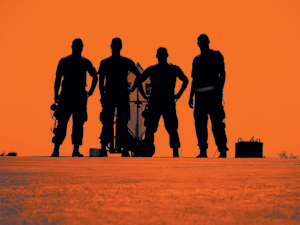A SOLDIER’S JOURNAL PROUDLY SERVING
 I plan my day off (Thursday) around my weekly volunteer opportunity at the hospital here at our base in Iraq. During the week I get to sleep by 02:00, but on Wednesday night I stay up a little later, maybe 03:00, we play euchre or ping-pong or just sit around and talk about the day, and the trip, and life. My alarm is set for 09:00 the other six days of the week, but sometimes I snooze until 09:30 or so. Depending on the day of the week, I have something scheduled for the hour or so before I shower, shave and get ready to go to work. On Sunday I go to Mass, Monday and
I plan my day off (Thursday) around my weekly volunteer opportunity at the hospital here at our base in Iraq. During the week I get to sleep by 02:00, but on Wednesday night I stay up a little later, maybe 03:00, we play euchre or ping-pong or just sit around and talk about the day, and the trip, and life. My alarm is set for 09:00 the other six days of the week, but sometimes I snooze until 09:30 or so. Depending on the day of the week, I have something scheduled for the hour or so before I shower, shave and get ready to go to work. On Sunday I go to Mass, Monday and
Friday I go to the gym or run, Tuesday and Saturday are laundry days. Wednesday I might sleep until 10:00. On Thursday I sleep until 12:30, 13:30 at the latest. I get up and shower and shave and put on my PT gear (Physical Training) – which is one of your two clothing options here, it’s either the DCU (Desert Camouflage uniform) or the PT gear at all times. PT gear means tennis shoes, not combat boots – which is one of the best parts of the day off.
Then I walk a mile or so to the bus stop. There are stops closer but this is the groove I’m in. I ride the bus over to the West side of the base. My first stop is the BX (Base Exchange) to pick up any items that I may need. If nothing else I buy a bag of “Now and Laters”. Then I go to Popeye’s chicken and get a #1, spicy, with mashed potatoes and a diet Coke (not that I’m in a rut or anything). Then I take the 25-minute ride back to our housing area enjoying the sights along the way. We are on the banks of the Tigris river, about 40 miles North of Baghdad. When I get back to my room I may write in my journal, read, listen to some music or just sit there alone and think. I reply to all the letters and packages I receive, so if I have letters to write, I do that then.
So I put on my DCU’s and get ready to go. It takes about 15 minutes to walk to the hospital. I try to arrive by 17:30. It gets dark here by 18:00. There is very little Helipad business before dark (extreme emergencies only, everyone else gets moved under the cover of darkness for obvious safety reasons.) It should come as no surprise that the Geneva Convention rule against shooting at a vehicle or airplane marked with a Red Cross doesn’t mean anything to the hajji’s. When I get to the hospital, I enter through the security station where I surrender my Military I.D. to the receptionist. They give you a “volunteer” badge, which you turn it on when you leave, and you get your I.D. back.
After that I go to the rear of the hospital to the Helipad, where I sign in as a volunteer. There are usually a few others there, sometimes there are several. The Pad Boss tells you when they are expecting incoming arrivals, as well as any scheduled departures for people – usually Iraqis injured by IED’s (Improvised Explosive Device’s) or VBIED’s (Vehicle Born Improvised Explosive Device’s). Then I plan my evening according to that. If there are departures or arrivals expected soon I just stay at the Pad. If nothing is going on at the time I move on to the ICU (Intensive Care Unit) or the ICW, (Intermediate Care Ward.) I go to whichever one needs the help. But based on how strong I’m feeling that day I decide which one to check first. If I’m not up to the challenge, I’ll go to the ICW first and hope that they have something to keep me out of the ICU. If I feel like conquering the world I’ll go to the ICU first. It always works out.
They have a list of things that they want/need volunteers to do, and the people that work there are great. They let you do as much or as little as you want. One day I spent 3 hours just sorting and stacking clean linen – hospital scrubs, sheets, blankets, clothes, etc. There are supply stands at each bed and there is a list of what is supposed to be in them. Sorting, organizing and re-filling them is one of the many volunteer jobs. You can also make beds, sweep, mop, or help folks that can move on their own get to the restroom or shower. And you can just visit with the injured. Sometimes they ask you to help change dressings, or help move people in their bed. I’ve even done a Doppler pulse check (with supervision of course) on the feet of an elderly Iraqi man wounded in a IED blast. If you want to work, you can always find something to do.
So I check the time, and listen for the tell-tale rattle of the incoming helicopters. Whether it’s the scheduled helicopters, or ones that come unexpectedly, we are always out at the Pad to meet them. The Pad Boss assigns teams of four to each gurney. When the medic on the helicopter signals that he, or she is ready, we move in and take our positions at the sliding side door. The helicopters are running and it’s a pretty hectic time, and it’s usually pretty dark. There is only minimal lighting out at the Pad because most of the time they land with their night-vision goggles (and all their lights out) a flashlight or any other bright light can glare the pilots vision. So we just work in the dark using whatever light there is. Two people position themselves on each side of the litter, which the patient is strapped to, and we move them out to the two-wheeled cart used to move them on into the E.R.
After securing the litter to the gurney two of us take positions on either end of the gurney and the other two people raise and secure the legs of the two-wheeled cart. When you get into the E.R. there are a lot of people waiting, depending on what they may already know about the incoming patient, there are also specialists there. Lots of nurses, doctors and technicians. Now you are inside and it is relatively quiet compared to where you just came from so you are wearing safety goggles, ear protection and you just came in out of the dark, so it’s hard to adjust to the change. I should add that everyone gets the same amount and quality of care whether they are U.S. military, Iraqi army, civilians or terrorists. It’s like watching old MASH re-runs, everyone gets taken care of, even the enemy, but not everyone is thrilled about it.
If you have the stomach for it you are allowed to stay and see what they do there in the E.R., as long as you are quiet and out of the way. I can always find something else to do. So then I go back to one of the wards, and continue the cycle until it gets to be 23:00 or so, maybe midnight if we are busy. It also depends on how tired I am and how stressful the casualties have been. I sign out, retrieve my I.D. then I walk back to my room, get my shower gear and get cleaned up for bed. I say a prayer for the people that I met that day and say a prayer that I won’t see them again that night in my dreams. And go to sleep. The next day begins another count down to my day off, and when I’ve had four more days off, hopefully I’ll be on my way home. I have reported before that they have a saying here, “Don’t count the days, Make the days count.” I’m sorry but I’m counting days. And praying that my dreams stay mine.
So for the people that have asked what I do on my day off, that’s about all I can say. I’d be happy to tell you more specifics … when I’m home.
- Celebrating 20 Years Of Community At The Stand - April 12, 2024
- First Positive Case Of Chronic Wasting Disease In Indiana - April 12, 2024
- Southwest Allen County Schools Embark On Major Tree Plantings - April 12, 2024


